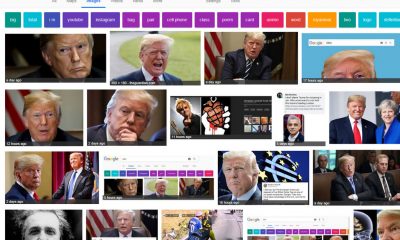World
US firm develops glasses for colour blindness

San Francisco: A US firm has given thousands of people their first look into the colours red and green by tricking the brain with a pair of sunglasses.
EnChroma, based in Berkeley, north of San Francisco, developed the colour blindness corrective gear two years ago and recently launched an upgraded model of sunglasses allowing users to play sports and is child-friendly, as per reported.
Over 340 million people around the world suffer from colour blindness, as the condition can hinder simple everyday activities, like driving.
“It’s not a serious condition,” EnChroma’s vice president Donald McPherson told Xinhua. “But it can make simple tasks appear impossible for the colour blind because they cannot make the distinction, for example, at traffic lights between red and green, and this is something that can be life-threatening.”
Usually, colour blind people are not allowed to work as policemen, firemen, pilots or electricians, because even though they can distinguish most of the colours, their brains mistake red and green, especially when they are faint hues. Those with normal colour vision have three photo-pigments in their eyes that are responsible to capture the light, with the brain doing the math to transform them into the right colour, whether it is blue, purple, yellow or red.
“Colour blind people overlap the red and green pigments in the brain a lot, so they get muddied colours,” McPherson said. To help the brain separate these hues, EnChroma developed a glass that divides red and green, cutting a little bit of light between the two colours.
With the corrective glass, McPherson said, “the normal wavelengths are restored because it captures the right pigments, making the brain understand which colours are there.”
McPherson was a leading researcher at University of California at Berkeley working on the issue with a grant from the US National Institutes of Health. He received a doctoral degree in glass engineering and in 2010, after five years of extensive research, decided to start up a company with his colleagues and market their product, which had been a success in clinical trials.
“Colour blindness is not just an aesthetic issue,” he said. “It can even be mistaken as a learning disability in children, because books and classes are not prepared for people who cannot see red and green,” he added.
The condition typically afflicts men because the recessive trait is passed on mainly to male offsprings. According to statistics, one in 12 men is colour blind, while one out of every 34 women has the condition.
National
Foodman Vishal Singh Honored for Hunger Free World Mission in Bangkok

Lucknow: Vishal Singh, a renowned social worker from Lucknow, also known as Foodman, has once again made India proud. He was honored by the Happy Hands Gloves Cooperative Limited Company in Korathai, Thailand, for his work with the Hunger Free World Mission.
The Hunger Free World Mission’s meeting was held in Korathai, Thailand, under Vishal Singh’s leadership. Representatives from several countries, including Mr. Raja Dwivedi (Managing Director of Happy Hands Gloves Limited), Thailand Coordinator Mr. Raja Mishra, and member Mr. Varun Singh, attended the event.

Under Vishal Singh’s leadership, the attendees took a pledge to work together toward creating a hunger-free world.
Speaking on the occasion, Vishal Singh explained that the main goal of the Hunger Free World Mission is social participation. He said the mission is not just about feeding people but also about meeting other basic needs of those who are struggling. The mission focuses on helping families of terminally ill patients in hospitals by providing food and shelter. It also works to fulfill essential needs like education, jobs, and care for the elderly.
For the last 16 years, the Vijay Sri Foundation has been providing free services, benefiting thousands of people. Vishal Singh highlighted that the mission aims to gain global recognition like other organizations such as WHO, WWF, and Red Cross, which work for social causes.
During this meeting, Vishal Singh was appointed as the Chairman of the Hunger Free World Mission by representatives from various countries. They also discussed holding regular meetings in different countries to push the mission forward.
Business tycoon Dr. Abhishek Verma has also supported this humanitarian mission, vowing to promote the idea of “Seva Parmo Dharma” (Service is the highest duty) worldwide. Vishal Singh praised him, stating that people like Dr .Abhishek Verma inspire others to work for the betterment of society.
Recently, Romania’s Ambassador, Mr . Daniela Sezonov Ţane, invited Vishal Singh to the Romanian Embassy in Delhi, where they discussed the mission in detail. Impressed by his humanitarian work, she honored Vishal Singh and invited him to Romania to take the mission forward .
Food man Vishal Singh has been serving the people of India for the past 16 years. Through the Vijay Sri Foundation, he provides free meals to cancer patients & their families ,shelter, and education for women & children along with running free old-age homes in Lucknow.
In addition to his humanitarian work, Vishal Singh also addresses issues like crime and corruption through his role as Chairman of Seva Path Media and Managing Director of Vijay Sri Foundation.

During the COVID-19 pandemic, Vishal Singh and his team worked tirelessly to provide food and help to the needy, including starving children, elderly citizens, and pregnant women. Despite contracting the virus himself, he continued to assist others after his recovery. He even created a life-saving oxygen regulator using household items, which was praised by doctors both in India and abroad.
In his address at the meeting, Vishal Singh spoke about his mission to create a hunger-free world. He pointed out that India’s large population, along with issues like unemployment and poverty, has caused the country to fall on the Hunger Index. He urged people to contribute just one handful of grains daily to help create a hunger-free world.
He concluded by saying that through social participation, we can empower the people around us, meet their basic needs, and work together to build a stronger, more prosperous, and developed society.















